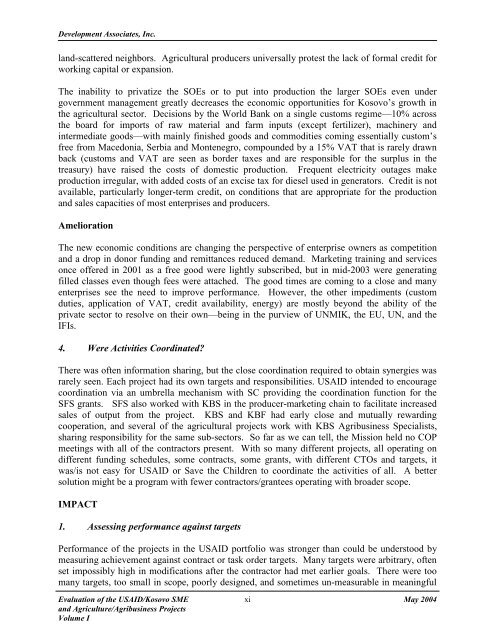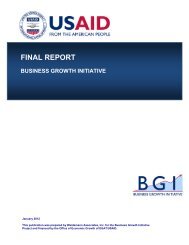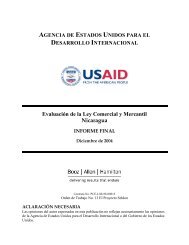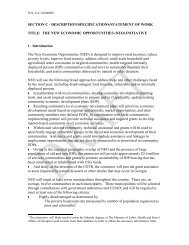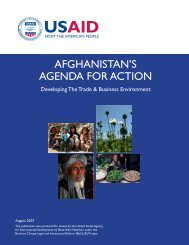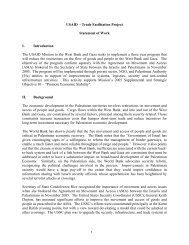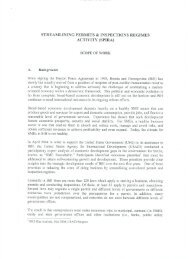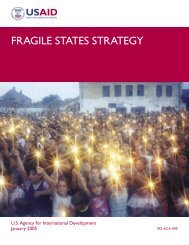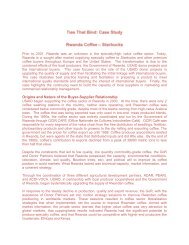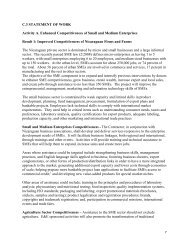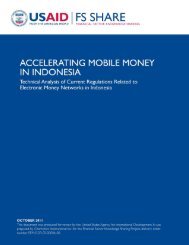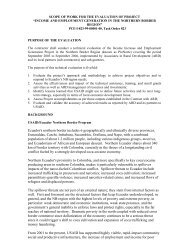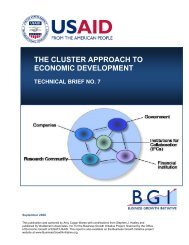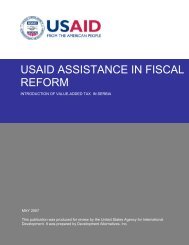Evaluation of the USAID-Kosovo SME and Agriculture - Economic ...
Evaluation of the USAID-Kosovo SME and Agriculture - Economic ...
Evaluation of the USAID-Kosovo SME and Agriculture - Economic ...
Create successful ePaper yourself
Turn your PDF publications into a flip-book with our unique Google optimized e-Paper software.
Development Associates, Inc.l<strong>and</strong>-scattered neighbors. Agricultural producers universally protest <strong>the</strong> lack <strong>of</strong> formal credit forworking capital or expansion.The inability to privatize <strong>the</strong> SOEs or to put into production <strong>the</strong> larger SOEs even undergovernment management greatly decreases <strong>the</strong> economic opportunities for <strong>Kosovo</strong>’s growth in<strong>the</strong> agricultural sector. Decisions by <strong>the</strong> World Bank on a single customs regime—10% across<strong>the</strong> board for imports <strong>of</strong> raw material <strong>and</strong> farm inputs (except fertilizer), machinery <strong>and</strong>intermediate goods—with mainly finished goods <strong>and</strong> commodities coming essentially custom’sfree from Macedonia, Serbia <strong>and</strong> Montenegro, compounded by a 15% VAT that is rarely drawnback (customs <strong>and</strong> VAT are seen as border taxes <strong>and</strong> are responsible for <strong>the</strong> surplus in <strong>the</strong>treasury) have raised <strong>the</strong> costs <strong>of</strong> domestic production. Frequent electricity outages makeproduction irregular, with added costs <strong>of</strong> an excise tax for diesel used in generators. Credit is notavailable, particularly longer-term credit, on conditions that are appropriate for <strong>the</strong> production<strong>and</strong> sales capacities <strong>of</strong> most enterprises <strong>and</strong> producers.AmeliorationThe new economic conditions are changing <strong>the</strong> perspective <strong>of</strong> enterprise owners as competition<strong>and</strong> a drop in donor funding <strong>and</strong> remittances reduced dem<strong>and</strong>. Marketing training <strong>and</strong> servicesonce <strong>of</strong>fered in 2001 as a free good were lightly subscribed, but in mid-2003 were generatingfilled classes even though fees were attached. The good times are coming to a close <strong>and</strong> manyenterprises see <strong>the</strong> need to improve performance. However, <strong>the</strong> o<strong>the</strong>r impediments (customduties, application <strong>of</strong> VAT, credit availability, energy) are mostly beyond <strong>the</strong> ability <strong>of</strong> <strong>the</strong>private sector to resolve on <strong>the</strong>ir own—being in <strong>the</strong> purview <strong>of</strong> UNMIK, <strong>the</strong> EU, UN, <strong>and</strong> <strong>the</strong>IFIs.4. Were Activities Coordinated?There was <strong>of</strong>ten information sharing, but <strong>the</strong> close coordination required to obtain synergies wasrarely seen. Each project had its own targets <strong>and</strong> responsibilities. <strong>USAID</strong> intended to encouragecoordination via an umbrella mechanism with SC providing <strong>the</strong> coordination function for <strong>the</strong>SFS grants. SFS also worked with KBS in <strong>the</strong> producer-marketing chain to facilitate increasedsales <strong>of</strong> output from <strong>the</strong> project. KBS <strong>and</strong> KBF had early close <strong>and</strong> mutually rewardingcooperation, <strong>and</strong> several <strong>of</strong> <strong>the</strong> agricultural projects work with KBS Agribusiness Specialists,sharing responsibility for <strong>the</strong> same sub-sectors. So far as we can tell, <strong>the</strong> Mission held no COPmeetings with all <strong>of</strong> <strong>the</strong> contractors present. With so many different projects, all operating ondifferent funding schedules, some contracts, some grants, with different CTOs <strong>and</strong> targets, itwas/is not easy for <strong>USAID</strong> or Save <strong>the</strong> Children to coordinate <strong>the</strong> activities <strong>of</strong> all. A bettersolution might be a program with fewer contractors/grantees operating with broader scope.IMPACT1. Assessing performance against targetsPerformance <strong>of</strong> <strong>the</strong> projects in <strong>the</strong> <strong>USAID</strong> portfolio was stronger than could be understood bymeasuring achievement against contract or task order targets. Many targets were arbitrary, <strong>of</strong>tenset impossibly high in modifications after <strong>the</strong> contractor had met earlier goals. There were toomany targets, too small in scope, poorly designed, <strong>and</strong> sometimes un-measurable in meaningful<strong>Evaluation</strong> <strong>of</strong> <strong>the</strong> <strong>USAID</strong>/<strong>Kosovo</strong> <strong>SME</strong> xi May 2004<strong>and</strong> <strong>Agriculture</strong>/Agribusiness ProjectsVolume I


